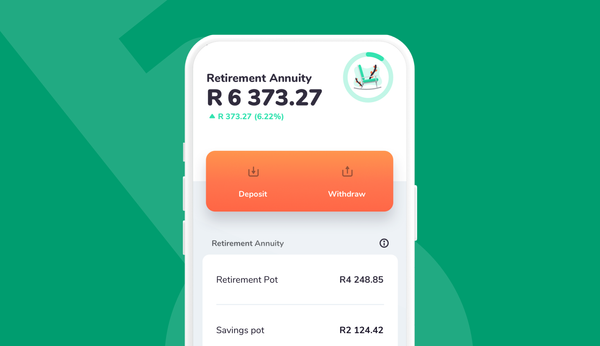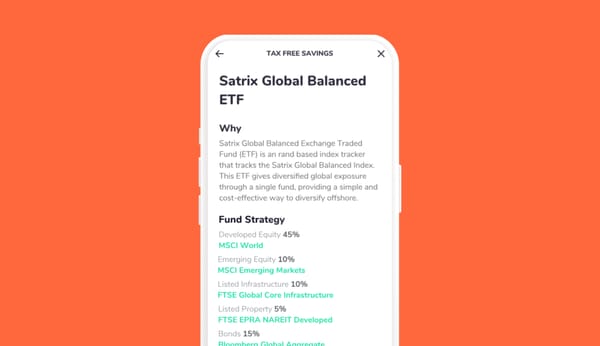Dividends are one way you can earn a return on your investment when you’re investing in equity-based investments. In this guide, we cover what dividends are, how dividends work and more.
What are dividends?
When you invest in shares or equity-based ETFs, like the Satrix 40 ETF and the Sygnia Itrix S&P500 ETF offered through Franc, there are 2 ways your investment can grow:
- The shares or ETFs can increase in value (capital appreciation),
- Dividends.
Dividends are (generally) cash payments made by a company to their shareholders (the individuals or organisations that own shares in their business).
These payments are a portion of the company’s earnings or profits. Some companies pay out dividends once a year, some twice a year, some quarterly and some not at all.
Some companies may wish to issue shareholders with a reward for holding their shares, but also want to keep cash on hand, so they offer more shares to shareholders instead of a cash dividend.
The shareholders can then choose whether they want to keep the shares received, or sell them in the market to make back what they would have received had they got a cash dividend.
How often are dividends paid?
In the local South African market, dividends are normally paid annually or twice a year, and announced together with a company’s financial results. Some large multinational companies, like British American Tobacco, announce and pay dividends quarterly (every three months).
There are a few important days when it comes to declaring and paying out dividends:
- Dividend Declaration Date: This is the day the dividend is announced to the public, along with the other dates below.
- Last Day to Trade: This is the last day that you can buy the share and still be entitled to the dividend. If you buy it the next day (which is known as trading ex-dividend), you won't be entitled to receive a dividend.
- Record Date: This refers to the date by which you need to be registered as a shareholder of the company to get the dividend and is 3 business days after the Last Day to Trade. This is because trading shares in South Africa takes 3 business days to complete.
- Payment Date: This is the date your dividend gets paid.
Here’s an example of a recent dividend timetable taken from a JSE-listed company:
Declaration date: Tuesday, 21 May 2024
Last day to trade cum dividend: Tuesday, 11 June 2024
Trading ex-dividend commences: Wednesday, 12 June 2024
Record date: Friday, 14 June 2024
Payment date: Tuesday, 18 June 2024
When a share trades ex-dividend, theoretically the share price should drop by the dividend amount. Having said this, general stock market movement on the day might make this less obvious in practice.
Why will the share price drop, you ask? Well in the dividend timetable example above, if you had bought a share on the 11th June and got paid the dividend, it makes sense that that same share on the 12th June – without the prospect of being paid a dividend – would trade for a lower value.
What companies pay dividends?
To determine whether a company pays dividends, it’s a good idea to look at their dividend policy. This outlines whether the company pays dividends, what percentage of their earnings they pay out as dividends, and how often they pay them out.
Note that this policy may change over time, depending on the financial performance of the company or other variables. There are certain reasons a company might not pay out a dividend, despite its policy.
When would a company not pay a dividend?
There are four main reasons a company may not pay out a dividend, despite it being part of its policy:
- When the company makes a loss. If a company makes a loss and not a profit, their business performance might not justify a cash payment to shareholders. That being said, some companies make a loss and still pay a dividend if they have enough cash on hand.
- If the company wants to grow the business. The directors of the company may feel that the cash in the business would be better utilised to grow the existing business through investing in new products or operations, or even acquiring other businesses with the ultimate aim of increasing value that way (to pay dividends in future or grow the company’s share price).
- If the company needs to repay debt. A company may have large outstanding loans that they want to prioritise repaying before returning money to shareholders.
- If the company wants to repurchase shares. Some companies choose to use the cash that they have on hand to repurchase their own shares on the stock exchange. They normally do this if they feel that their shares are cheap or undervalued relative to what they think they are worth. If they are correct and the shares rise in value then the financial outcome is similar to (if not better) than if a dividend was paid to shareholders and shareholders used this money to buy shares in the company at the low price.
There is also nothing stopping companies from doing all of the above and still paying out a dividend. It is a balancing act the directors have to carry out to figure out what the best use of capital is.
Do I get taxed on dividends?
If you hold shares as an individual then you pay a 20% dividend withholding tax (DWT) on any dividends paid out by a company. This tax is deducted at source so the money you receive in your trading account has already been taxed.
If you hold shares through a company (i.e. you own a company that owns shares), any dividends paid to the company you own does not carry any DWT. However, if you want to pay that out to yourself from the company, your company would have to pay the South African Revenue Service (SARS) the 20% DWT.
What does Franc do with my dividends?
We believe that investing in the stock market is best for the long term, and in order to give your investment the best chance to grow, it is best to reinvest the dividends you receive back into the shares you own. This is exactly what Franc does for you if you invest in the local or offshore equity funds.
That means that any dividends received on Satrix 40 ETF are currently reinvested into buying you more Satrix 40 ETF units. Any dividends received on the Sygnia Itrix S&P500 ETF are used to buy more units (if they can buy full units), otherwise they are allocated to your excess cash account.










